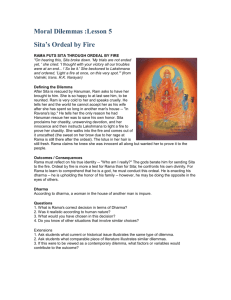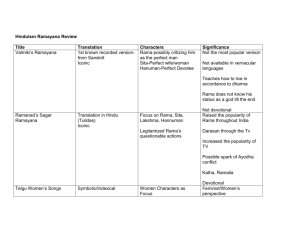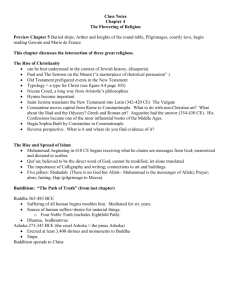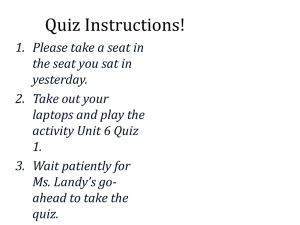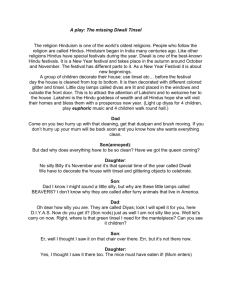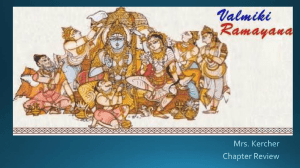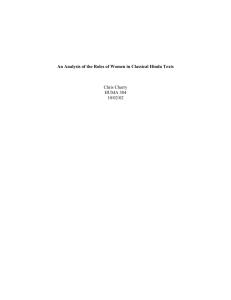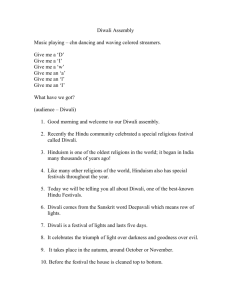1. Women of Ramayana (Kavita Gupta)
advertisement
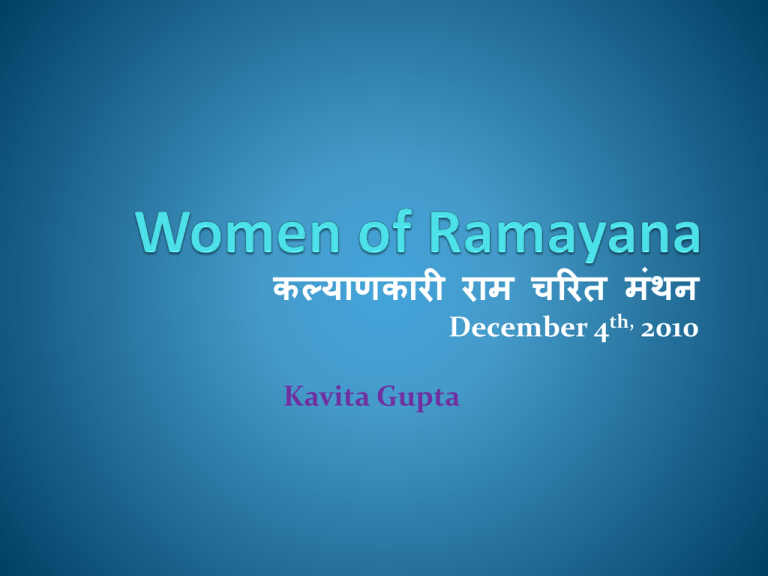
कल्याणकारी राम चररत मंथन December 4th, 2010 Kavita Gupta Rama the Great Maryada Purushottama Behind every successful man, there are many women! The story of Ramayana would not have existed without the critical roles that women played. Without the female intervention in Ramayana, the life of Rama would have been the story of a typical prince. Divine Birth Goddess Earth, Bhumidevi, went to Brahma begging to be rescued from Ravana who was plundering her resources and destroying life through bloody wars and evil conduct. Mother Kaushalya was Aditi in a prior life, the wife of sage Kashyap. She had given birth to the demi-Gods Indra, Surya, Agni, etc. She expressed a desire to the Supreme God that she wished that He would be born to her. God then assured Aditi that when he would descend on earth in his avatar as Rama, she would be his mother. This is why Kaushalya, a reincarnation of Aditi, was chosen to give birth to Rama. The Mothers Kaushalya, Sumitra, and Kaikeyi The queens were overjoyed with the arrival of these four lovely princes. The palace was filled with joy and merriment. Becoming a Warrior Rama's first encounter is with Tadaka, a rakshasi. Vishwamitra explains that she has polluted much of the habitat where the sages reside. Rama has some reservations about killing a woman, but since Taataka poses such a big threat to the Rishis and he is expected to follow their word, he fights with Taataka and her sons Mareecha and Subahu. Destined Love Rama and Sita are the protagonists in one of the most famous love stories of all time. It was normal for kings to have more than one wife, Rama and Sita gave the ideal of having a monogamous marriage. When Sita is kidnapped by Ravana, both Sita and Rama undergo great personal hardships during their separation. When Ravana kidnaps Sita, Rama is distraught. Rama says to Lakshman, "If Sita is alive I will return to the asrama, if she is dead I will relinquish my life.” Winning over the Critics Sita’s swayambar presented an opportunity to impress the toughest critics. Rama shoots the arrow up into the sky with Vishnu's bow, performing a feat true to his supreme, divine nature with his natural weapon. It is said that the Rama's arrow is still flying across space, across time and across all of the universe. The day it will return to earth, it is said, it will bring the end of the world. Others say that the flying arrow destroys all evil on earth to uphold dharma and righteousness. The Perfect Wife The Perfect Wife With your husband you chose exile: suffered privation, abduction, then the rejection the chastity test on scorching flames, the victim twice victimized. Could those flames turn to flowers without searing the soul? they say you, devoted wife, questioned him not and let him have his way. --Bina Agarwal The Perfect Wife When Rama is banished from the kingdom, he attempts to convince Sita not to join him in a potentially dangerous and certainly arduous existence in the jungle, but Sita rejects this. Sita is also known for her chastity. She even maintained it with a blade of grass. She willingly went through agnipariksha to prove her chastity. In the words of Swami Vivekananda, " There may have been several Ramas, perhaps, but only one Sita." Agnipariksha Agnipariksha Sita walks into the flames. But to their greater shock and wonder, she is completely unharmed. Instead, she glows radiantly from the centre of the pyre. Immediately Rama runs to Sita and embraces her. He had never doubted her purity for a second, but, as he explains to a dazzled Sita, the people of the world would not have accepted or honored her as a queen or a woman if she had not passed this Agnipariksha before the eyes of hundreds, where Agni would destroy the impure and sinful, but not touch the pure and innocent. Mother of Luv-Kush When banished by Lord Rama to the forest, Sita tells Lakshmana that she would not end her life as she carried the seed of the royal family. She gave birth to the twins and did not leave the mortal world until they were reunited with their father. Banished Kaikeyi, influenced by Manthara, demands that Dasaratha banish Rama to a forest exile for fourteen years. Rama does not bear any anger towards Kaikeyi, believing firmly in the power of destiny. This exile presents Rama the opportunity to confront Ravana and his evil empire. Surpanakha Catalyst for war! She had orchestrates the war either to seek revenge for her insult or against Ravana for murdering husband. She intices Ravana to abduct Sita to make her his wife. Shabri Exemplary devotee Perseverance Mandodri The unfortunate wife and mother Ravana threatening to kill Sita unless she marries him, Mandodari saves Sita by holding Ravana's hand. Mandodari says that the murder of a woman is a heinous sin and thus Ravana should not kill Sita. Trijata You Decide Sita’s Banishment A: Adarsh King B: Curse from Rishi Agastya C: Protective Husband D: Not part of original story Lessons from the Women The women are categorized as either meek and good or as bold and evil. The message to women was clear. If you remain within the bounds set by the male dominated society you will be ‘deified’ like Sita was. If you break the barriers you will become an outcast. Women in the Ramayana are “dependent on their men, morally inferior and poor decision makers,” though these qualities do not keep them from being honored. The traits that the women hold in Ramayana are a guideline to the readers. This culture is still existent in India. Women are loyal, subservient, faithful, loving, and compassionate towards their husbands. References 1. Hindu Mythology By Harsh Nevatia http://www.suite101.com/lesson.cfm/18770/2182/6 2. Hindu Women: A Look at Historical Depictions ksuweb.kennesaw.edu/~tkeene/ogtthoughtpapsamp leA.htm#_ftn7 3. Leading Female Roles in Ramayana http://www.echeat.com/essay.php?t=32382 4. http://www.swadharma.org/2009/02/17/causesfor-debate-in-the-ramayana/

